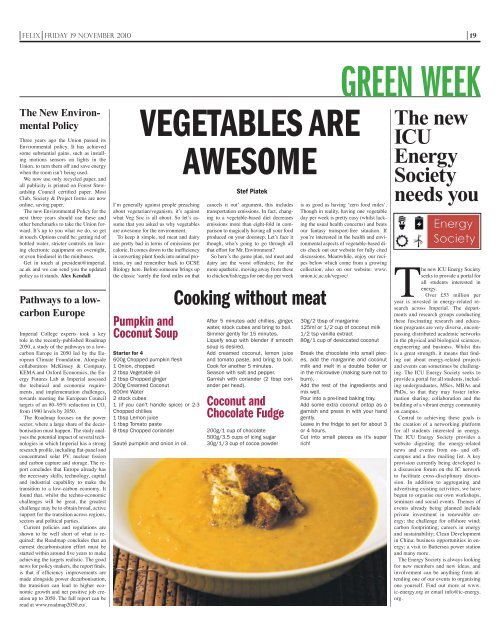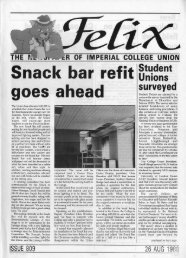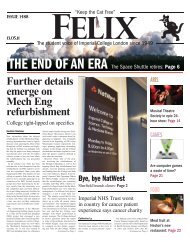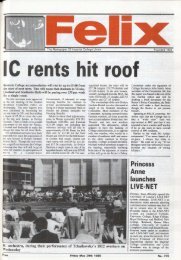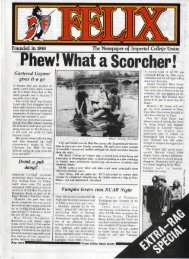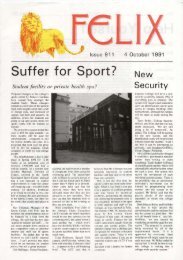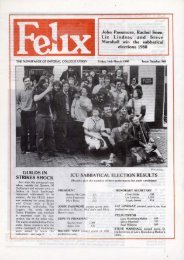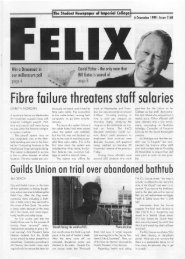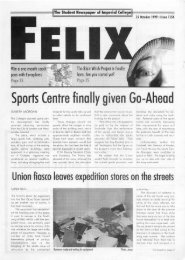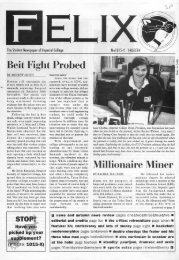1 - 9 News.indd - Felix
1 - 9 News.indd - Felix
1 - 9 News.indd - Felix
You also want an ePaper? Increase the reach of your titles
YUMPU automatically turns print PDFs into web optimized ePapers that Google loves.
FELIX Friday 19 November 2010<br />
19<br />
The New Environmental<br />
Policy<br />
Three years ago the Union passed its<br />
Environmental policy. It has achieved<br />
some substantial gains, such as installing<br />
motions sensors on lights in the<br />
Union, to turn them off and save energy<br />
when the room isn’t being used.<br />
We now use only recycled paper, and<br />
all publicity is printed on Forest Stewardship<br />
Council certifi ed paper. Most<br />
Club, Society & Project forms are now<br />
online, saving paper.<br />
The new Environmental Policy for the<br />
next three years should use these and<br />
other benchmarks to take the Union forward.<br />
It’s up to you what we do, so get<br />
in touch. Options could be: getting rid of<br />
bottled water, stricter controls on leaving<br />
electronic equipment on overnight,<br />
or even biodiesel in the minibuses.<br />
Get in touch at president@imperial.<br />
ac.uk and we can send you the updated<br />
policy as it stands. Alex Kendall<br />
Pathways to a lowcarbon<br />
Europe<br />
Imperial College experts took a key<br />
role in the recently-published Roadmap<br />
2050, a study of the pathways to a lowcarbon<br />
Europe in 2050 led by the European<br />
Climate Foundation. Alongside<br />
collaborators McKinsey & Company,<br />
KEMA and Oxford Economics, the Energy<br />
Futures Lab at Imperial assessed<br />
the technical and economic requirements,<br />
and implementation challenges,<br />
towards meeting the European Council<br />
targets of an 80–95% reduction in CO 2<br />
from 1990 levels by 2050.<br />
The Roadmap focuses on the power<br />
sector, where a large share of the decarbonisation<br />
must happen. The study analyses<br />
the potential impact of several technologies<br />
in which Imperial has a strong<br />
research profi le, including fl at-panel and<br />
concentrated solar PV, nuclear fi ssion<br />
and carbon capture and storage. The report<br />
concludes that Europe already has<br />
the necessary skills, technology, capital<br />
and industrial capability to make the<br />
transition to a low-carbon economy. It<br />
found that, whilst the techno-economic<br />
challenges will be great, the greatest<br />
challenge may be to obtain broad, active<br />
support for the transition across regions,<br />
sectors and political parties.<br />
Current policies and regulations are<br />
shown to be well short of what is required;<br />
the Roadmap concludes that an<br />
earnest decarbonisation effort must be<br />
started within around fi ve years to make<br />
achieving the targets realistic. The good<br />
news for policy-makers, the report fi nds,<br />
is that if effi ciency improvements are<br />
made alongside power decarbonisation,<br />
the transition can lead to higher economic<br />
growth and net positive job creation<br />
up to 2050. The full report can be<br />
read at www.roadmap2050.eu/.<br />
VEGETABLES ARE<br />
AWESOME<br />
I’m generally against people preaching<br />
about vegetarian/veganism, it’s against<br />
what Veg Soc is all about. So let’s assume<br />
that you asked us why vegetables<br />
are awesome for the environment.<br />
To keep it simple, red meat and dairy<br />
are pretty bad in terms of emissions per<br />
calorie. It comes down to the ineffi ciency<br />
in converting plant foods into animal proteins,<br />
try and remember back to GCSE<br />
Biology here. Before someone brings up<br />
the classic ‘surely the food miles on that<br />
Pumpkin and<br />
Coconut Soup<br />
Starter for 4<br />
600g Chopped pumpkin fl esh<br />
1 Onion, chopped<br />
2 tbsp Vegetable oil<br />
2 tbsp Chopped ginger<br />
200g Creamed Coconut<br />
600ml Water<br />
2 stock cubes<br />
1 (if you can’t handle spice) or 2-3<br />
Chopped chillies<br />
1 tbsp Lemon juice<br />
1 tbsp Tomato paste<br />
8 tbsp Chopped coriander<br />
Sauté pumpkin and onion in oil.<br />
Stef Piatek<br />
cancels it out’ argument, this includes<br />
transportation emissions. In fact, changing<br />
to a vegetable-based diet decreases<br />
emissions more than eight-fold in comparison<br />
to magically having all your food<br />
produced on your doorstep. Let’s face it<br />
though, who’s going to go through all<br />
that effort for Mr. Environment?<br />
So here’s the game plan, red meat and<br />
dairy are the worst offenders; for the<br />
more apathetic, moving away from these<br />
to chicken/fi sh/eggs for one day per week<br />
Cooking without meat<br />
After 5 minutes add chillies, ginger,<br />
water, stock cubes and bring to boil.<br />
Simmer gently for 15 minutes.<br />
Liquefy soup with blender if smooth<br />
soup is desired.<br />
Add creamed coconut, lemon juice<br />
and tomato paste, and bring to boil.<br />
Cook for another 5 minutes.<br />
Season with salt and pepper.<br />
Garnish with coriander (2 tbsp coriander<br />
per head).<br />
Coconut and<br />
Chocolate Fudge<br />
200g/1 cup of chocolate<br />
500g/3.5 cups of icing sugar<br />
30g/1/3 cup of cocoa powder<br />
GREEN WEEK<br />
is as good as having ‘zero food miles’.<br />
Though in reality, having one vegetable<br />
day per week is pretty easy (whilst lacking<br />
the usual health concerns) and beats<br />
our fantasy transport-free situation. If<br />
you’re interested in the health and environmental<br />
aspects of vegetable-based diets<br />
check out our website for fully cited<br />
discussions. Meanwhile, enjoy our recipes<br />
below which come from a growing<br />
collection, also on our website: www.<br />
union.ic.ac.uk/vegsoc/<br />
30g/2 tbsp of margarine<br />
125ml or 1/2 cup of coconut milk<br />
1/2 tsp vanilla extract<br />
80g/1 cup of desiccated coconut<br />
Break the chocolate into small pieces,<br />
add the margarine and coconut<br />
milk and melt in a double boiler or<br />
in the microwave (making sure not to<br />
burn).<br />
Add the rest of the ingredients and<br />
mix well.<br />
Pour into a pre-lined baking tray.<br />
Add some extra coconut ontop as a<br />
garnish and press in with your hand<br />
gently.<br />
Leave in the fridge to set for about 3<br />
or 4 hours.<br />
Cut into small pieces as it’s super<br />
rich!<br />
The new<br />
ICU<br />
Energy<br />
Society<br />
needs you<br />
The new ICU Energy Society<br />
seeks to provide a portal for<br />
all students interested in<br />
energy.<br />
Over £53 million per<br />
year is invested in energy-related research<br />
across Imperial. The departments<br />
and research groups conducting<br />
these fascinating research and education<br />
programs are very diverse, encompassing<br />
distributed academic networks<br />
in the physical and biological sciences,<br />
engineering and business. Whilst this<br />
is a great strength, it means that fi nding<br />
out about energy-related projects<br />
and events can sometimes be challenging.<br />
The ICU Energy Society seeks to<br />
provide a portal for all students, including<br />
undergraduates, MScs, MBAs and<br />
PhDs, so that they may foster information<br />
sharing, collaboration and the<br />
building of a vibrant energy community<br />
on campus.<br />
Central to achieving these goals is<br />
the creation of a networking platform<br />
for all students interested in energy.<br />
The ICU Energy Society provides a<br />
website digesting the energy-related<br />
news and events from on- and offcampus<br />
and a free mailing list. A key<br />
provision currently being developed is<br />
a discussion forum on the IC network<br />
to facilitate cross-disciplinary discussion.<br />
In addition to aggregating and<br />
advertising existing activities, we have<br />
begun to organise our own workshops,<br />
seminars and social events. Themes of<br />
events already being planned include<br />
private investment in renewable energy;<br />
the challenge for offshore wind;<br />
carbon footprinting; careers in energy<br />
and sustainability; Clean Development<br />
in China; business opportunities in energy;<br />
a visit to Battersea power station<br />
and many more.<br />
The Energy Society is always looking<br />
for new members and new ideas, and<br />
involvement can be anything from attending<br />
one of our events to organising<br />
one yourself. Find out more at www.<br />
ic-energy.org or email info@ic-energy.<br />
org.


